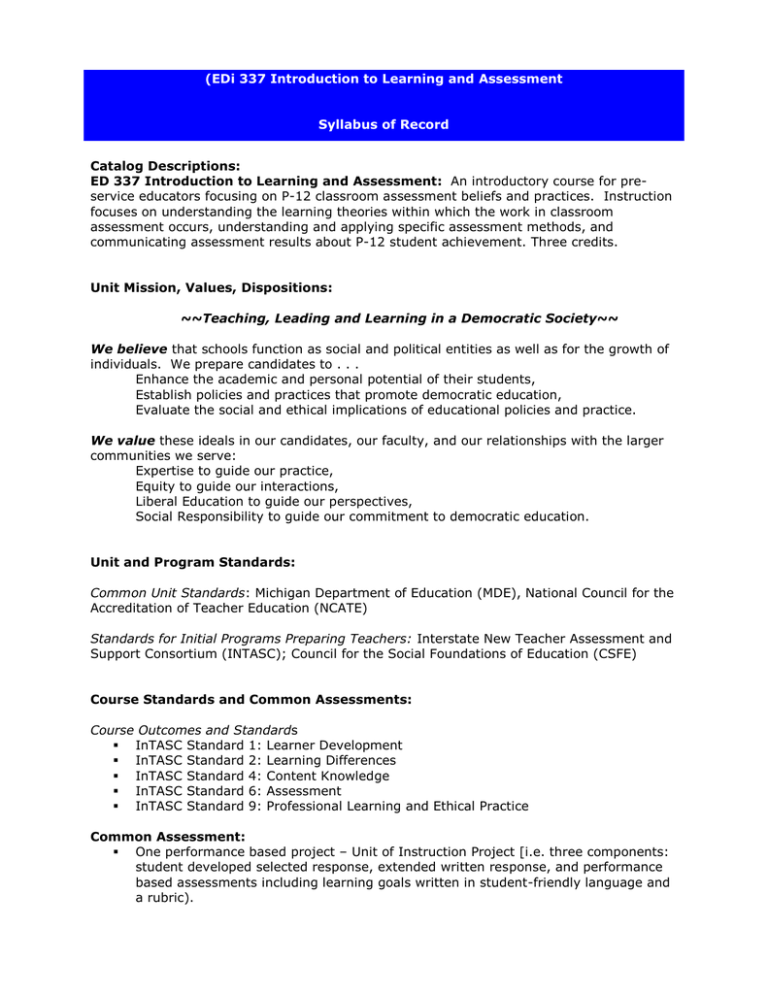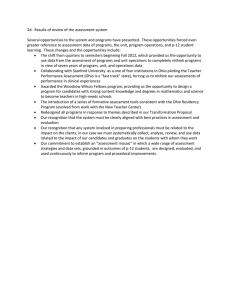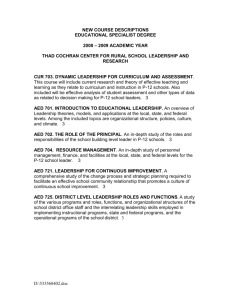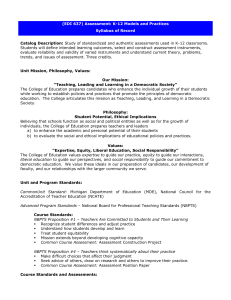(EDi 337 Introduction to Learning and Assessment Syllabus of Record Catalog Descriptions:
advertisement

(EDi 337 Introduction to Learning and Assessment Syllabus of Record Catalog Descriptions: ED 337 Introduction to Learning and Assessment: An introductory course for preservice educators focusing on P-12 classroom assessment beliefs and practices. Instruction focuses on understanding the learning theories within which the work in classroom assessment occurs, understanding and applying specific assessment methods, and communicating assessment results about P-12 student achievement. Three credits. Unit Mission, Values, Dispositions: ~~Teaching, Leading and Learning in a Democratic Society~~ We believe that schools function as social and political entities as well as for the growth of individuals. We prepare candidates to . . . Enhance the academic and personal potential of their students, Establish policies and practices that promote democratic education, Evaluate the social and ethical implications of educational policies and practice. We value these ideals in our candidates, our faculty, and our relationships with the larger communities we serve: Expertise to guide our practice, Equity to guide our interactions, Liberal Education to guide our perspectives, Social Responsibility to guide our commitment to democratic education. Unit and Program Standards: Common Unit Standards: Michigan Department of Education (MDE), National Council for the Accreditation of Teacher Education (NCATE) Standards for Initial Programs Preparing Teachers: Interstate New Teacher Assessment and Support Consortium (INTASC); Council for the Social Foundations of Education (CSFE) Course Standards and Common Assessments: Course Outcomes and Standards InTASC Standard 1: Learner Development InTASC Standard 2: Learning Differences InTASC Standard 4: Content Knowledge InTASC Standard 6: Assessment InTASC Standard 9: Professional Learning and Ethical Practice Common Assessment: One performance based project – Unit of Instruction Project [i.e. three components: student developed selected response, extended written response, and performance based assessments including learning goals written in student-friendly language and a rubric). Major Topics: Instructional practices are informed by learning theories, thus understanding and being familiar with learning theories is important to teaching. Theories such as educational psychology, theories of learning and motivation, social theories of learning, sociology, validity and reliability theory, formative and summative assessment theory will be discussed as each relates to P-12 school settings. The application and connection of learning theory to instructional practices as each relates to classroom assessment for positive student outcomes in P-12 school settings. Understanding basis of and rationale for why we assess in P-12 school settings. Measurement theory and assessment related issues such as validity, reliability, bias, and scoring concerns as they relate to P-12 student learning and achievement. Defining achievement standards for assessment in P-12 school settings. Understanding learning theory through instructional application as evidenced in P-12 school settings by: o designing quality selected response assessments o designing quality constructed response assessments o designing quality performance assessments o designing informal formative assessments Managing and communicating achievement results in P-12 school settings and how these direct instructional practices. Summative assessment (i.e. assessments for report cards in P-12 school settings) Involving P-12 students in communicating assessment results (i.e. portfolios, conferences) Interpreting and communicating standardized test scores in P-12 school settings. Theoretical Models Integrated Assessment and Instruction theorists: James Popman; Richard Stiggens; and Robert Marzano Bloom’s Taxonomy – Bloom Zone of Proximal Development – Vygotsky Shared interactions and shared experiences – constructivism – Piaget and Vygotsky Cognitivism – Gagne’, Merrill, and Bloom – conditions for learning Performance support theory - Performance reduced into smaller complex tasks e.g. computer support system – Gery Blended Learning Theory – combining all of the above – Connectivism Triarchic theory of (successful) Intelligence – Sternberg - contends that intelligent behavior arises from a balance between analytic, creative and practical abilities Backward Design – Understanding by Design – Wiggins and McTighe Multiple Intelligence – Gardner Philosophy of Differentiation – Carol Ann Tomlinson Course Knowledge Base: Costa, A., & Kallick, B. (Eds.) (2000) Assessing and reporting. Alexandria, VA: Association of Supervision and Curriculum Development. Langer, G.M., Bernstein Colton, A., & Goff, L.S. (2003). Collaborative analysis of student work: Improving teaching and learning. Alexandria, VA: Association of Supervision and Curriculum Development. Marzano, R.J., Pickering, D., & McTighe, J. (1993). Assessing student outcomes: Performance assessment using the dimensions of learning model. Alexandria, VA: Association of Supervision and Curriculum Development. Marzano, R.J. (2000). Transforming classroom grading. Alexandria, VA: Association of Supervision and Curriculum Development. Osborne, N.M. (1998). Rubrics for elementary assessment. Livonia, MI: Osborne Press. Popham, W.J. (2003). Test better, teach better: The instructional role of assessment. Alexandria, VA: Association of Supervision and Curriculum Development. Popham, W. J. (2007). Classroom assessment: What teachers need to know. Upper Saddle River, NJ: Allyn & Bacon. Rolheiser, C., Bower, B., & Stevahn, L. (2000). The portfolio organizer: Succeeding with portfolios in your classroom. Alexandria, VA: Association of Supervision and Curriculum Development. Stiggins, R. J. (2004). Student-involved classroom assessment (4th Edition). Upper Saddle River, NJ: Prentice Hall. Stiggins, R. J., Arter, J. A., Chappuis, J., & Chappuis, S. (2006). Classroom assessment for student learning. Portland, OR: Educational Testing Services. Tucker, P.D., & Stronge, J.H. (2005). Linking teacher evaluation and student learning. Alexandria, VA: Association of Supervision and Curriculum Development. Wahlstrom, D. (2005). Designing high-quality paper-and-pencil tests. Suffolk, VA: Successline, Inc.


